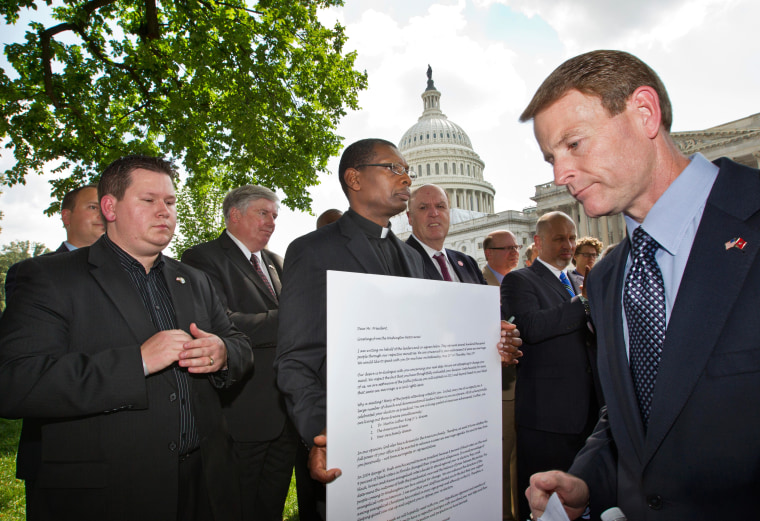One of the most important tests of whether or not The Great Republican Overreach has been rejected definitively will come next week when Wisconsin voters decide whether or not to recall Scott Walker, their embattled (and well-funded) Republican governor. (Per Greg Sargent's report today, former President Bill Clinton will be campaigning tomorrow in Wisconsin against Walker.)
However, we've now seen two things happen today that should give pause to those Republicans who remain eager to go off the legislative deep end. (Will it? Probably not. But still.)
First, we learned earlier today that the three-judge panel in the U.S. Court of Appeals for the First Circuit ruled unanimously that the Defense of Marriage Act is unconstitutional. Yes, DOMA was signed into law by Clinton, but well before President Obama's recent endorsement of marriage equality, he said in February 2011 that his Justice Department would no longer defend the 1996 law.
Chris Geidner of Metro Weekly reports that this "is the first instance of a federal appellate court striking down any portion of the 1996 law," and that since Supreme Court review is, as the judges put it, "highly likely" -- they've put off implementing their decision. (It should be noted that two of the judges are Republican appointees.)
This, as Andrew Sullivan notes in his Daily Beast blog, was the one of the key passages in the ruling, written by a George H.W. Bush nominee:
[M]any Americans believe that marriage is the union of a man and a woman, and most Americans live in states where that is the law today. One virtue of federalism is that it permits this diversity of governance based on local choice, but this applies as well to the states that have chosen to legalize same-sex marriage. Under current Supreme Court authority, Congress' denial of federal benefits to same-sex couples lawfully married in Massachusetts has not been adequately supported by any permissible federal interest.
Sullivan is right correct that this is not only a argument for federalism, but also for the principles that Republicans claim to support: that states should be able to make up their own laws, unimpeded by the federal government. As such, one marriage license in one state should not be prevented from maintaining its validity in another simply because the federal government says so.
Dan Savage elaborates on this point, noting that if only to prevent gays moving en masse out of restrictive states, Republicans should welcome today's news:
If Section Three of DOMA goes and the rest is allowed to stand, the feds would have to recognize the rights of legally married same-sex couples but state governments in places where same-sex marriage is illegal would not...You would think that opponents of marriage equality in states like, say, North Carolina (where loving Christian ministers are calling for gay men and lesbian[s] to be placed in concentration camps and allowed to die), or Kansas (where loving Christian ministers are calling on the federal government to execute gay men and lesbians), would be delighted at the prospect of a DOMA stripped of Section Three.
This is a key point to understand now and going forward about exactly why Republicans are overreaching. It has nothing at all to do with what is quote-unquote "moral," or "godly." It has to do with using power in ways they see fit. Republicans aren't so much anti-government in their recent legislative actions as much as they're anti-government-that-isn't-led-by-them. What's so odd about the Republican overreach is that one of its main goals has been the limiting of their power base to elderly white men who live only in certain states -- some of whom are rich and can fund their campaigns to kingdom come, and others who they'll simply use cultural issues to trick into voting for them. (And it's working.)
Interestingly, the second federal court block of the day deals with one way in which the GOP is seeking to maintain said power:
A federal judge has issued an injunction barring enforcement of part of Florida’s controversial new election law, ruling that a 48-hour deadline for third party groups to turn in voter registration forms is “harsh and impractical.”Tallahassee federal Judge Robert Hinkle left intact much of the rest of the law, passed by the GOP-controlled legislature and signed by Gov. Rick Scott last year. Portions of that law are also being challenged in federal court in Washington.
We mentioned earlier the political opposition to Governor Rick Scott's law, and we'll keep you posted as to how other challenges fare.
